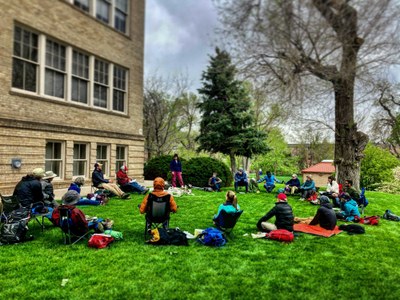
Wilderness Medicine & Risk Management Course
Wilderness First Aid
This WFA course teaches students the skills to anticipate risks and hazards, identify medical, traumatic, and environmental problems, recognize life-threatening issues, initiate basic care, and deliver a cohesive report. The curriculum forces students to think creatively, adapt to ever changing situations, and learn valuable leadership, decision making, and communication skills.
- Sat, May 18, 2024 - Sun, May 19, 2024
- Committee: CMC State
- Members: $250.00 Guests: $300.00
- Availability: 9 (30 capacity)
- Cancellation & Refund Policy
TIME: 8AM - 5PM WITH A ONE-HOUR LUNCH BREAK
Plan to bring your lunch as there aren't nearby options available.
LOCATION: UCHealth Community Education Center, 2050 Kidskare Pt Colorado Springs CO 80910
Prior to class, each student is required to read sections 6-9 found in the Wilderness Medicine Field Guide (found in Course Materials tab) and take the rest.
The class schedule is typically 8am - 4:30pm with a 30min lunch break. Lessons and practice scenarios may take place inside or outside, so be prepared for a variety of weather conditions.
There are no prerequisites. This class is only open to students 18 years and over. This class satisfies the requirements for CMC trip leaders.
Registration will close and students will gain access to all materials one week prior to the field session. The email address you use when registering will be the email used for all course-related resources.
The CMC offers Wilderness First Aid and Wilderness First Responder classes through Backcountry Pulse. All Backcountry Pulse programs are taught to the current internationally accepted wilderness medicine guidelines and are continually updated to reflect the latest evidence-based practices. All courses are globally recognized.
Badges you will earn:
This course has no scheduled activities.
Packing List:
- Notebook and pen
- Personal hand sanitizer
- Watch (or cell phone with timer)
- Day pack packed with the gear you primarily recreate with (This could be trail running, climbing gear, ski equipment, etc. We want you to practice improvising with the equipment you already own.)
- Closed-toe shoes (i.e. hiking boots or trail runners)
- Clothing that allows you to be comfortable in a variety of weather conditions
- Water, snacks & lunch (or money to buy lunch)
- Camp chair or pad
- Sleeping pad (so you don't have to lay directly on grass for the scenarios)
- Clipboard or hard surface to write on
You must register for this course to see course materials.

 Wilderness First Aid Course
Wilderness First Aid Course